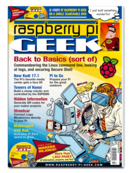Parenting Makers
Paul Brown
My dad was a maker. He was a professional designer and a classically trained painter. Back then, he was designing and building window displays for Oxford Street shops. One of his things were paper sculptures. He made galleons, desert islands, trees, and fairy tale characters of exquisite detail out of carefully cut and folded snow-white sheets of fine card.
My dad was a maker. He was a professional designer and a classically trained painter. Back then, he was designing and building window displays for Oxford Street shops. One of his things were paper sculptures. He made galleons, desert islands, trees, and fairy tale characters of exquisite detail out of carefully cut and folded snow-white sheets of fine card.
He was a decent carpenter too, and he built the furniture for our living room. For us kids, he built a slide for our tiny back garden, and a rocking horse following the designs laid out by my sister. Once it was finished, it seemed so enormous to four-year-old me that I cried when my mother tried to sit me on it.
Although he didn't want us, his children, to be artists because he thought we would always be poor and miserable, he tried to instill in us his love for DIY and creative handicraft. He bought us tools and gave us leftover pieces of wood and, at the weekend, we'd go out into our back garden and toil away with hammers, saws and sandpaper, trying to build a rocket, a go-cart, a Dalek, or what have you.
[...]
Use Express-Checkout link below to read the full article (PDF).







